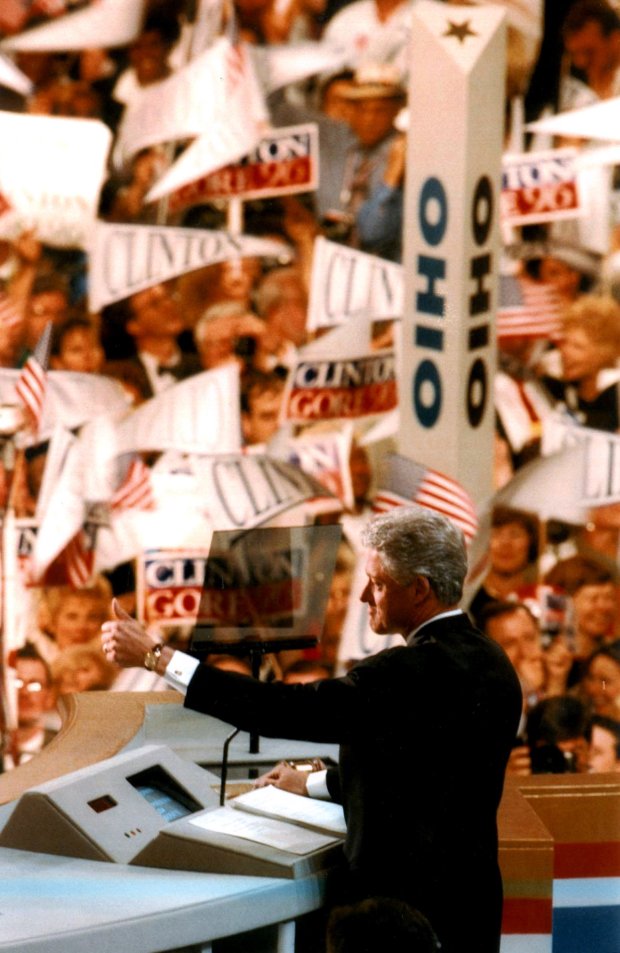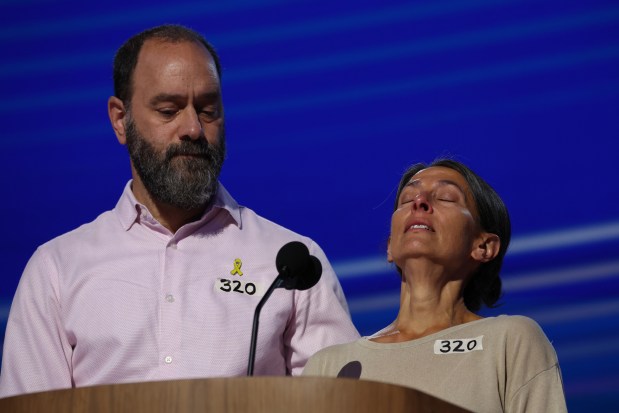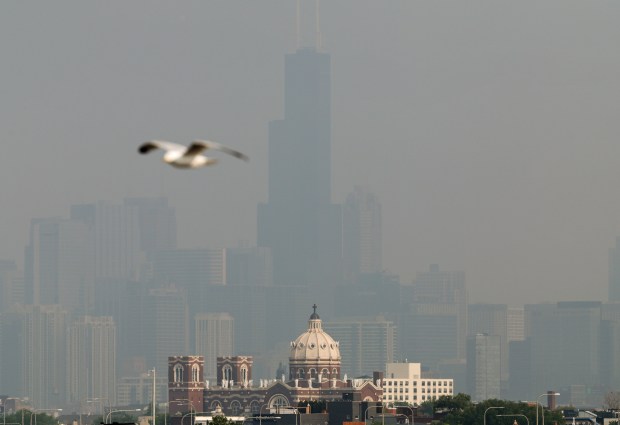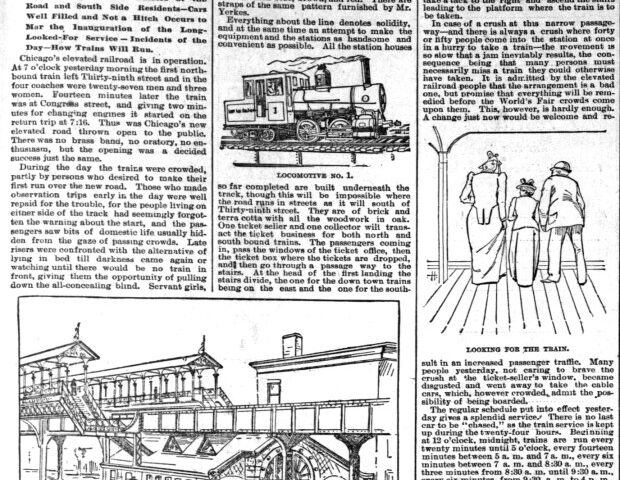It was 1996 when Bill Clinton last set foot on a Democratic convention stage at the United Center, accepting his party’s renomination for president and calling on the nation to build a bridge to the 21st century.
He marveled at the prospect of computers in every classroom replacing blackboards and vowed that 12-year-olds would soon be able to easily access the internet, then known colloquially as the “information superhighway.”
Yes, much has changed in 28 years as Clinton, now 78, prepared Wednesday evening to take the stage again at the Democratic National Convention, this time to voice support for Vice President Kamala Harris’ presidential nomination.
For one, Clinton still retains a connection to the older white rural voters who have since largely abandoned the Democratic Party in favor of Donald Trump. His acceptance speech in the then two-year-old United Center also was a reminder of more quaint and gentle political times.
He said of rivals Republican Sen. Bob Dole of Kansas and independent billionaire Ross Perot of Texas, “I will not attack them personally or permit others to do it in this party if I can prevent it,” adding that his was to be “a campaign of ideas, not a campaign of insults.”
“The American people deserve it,” he said.
That may still hold true. But much like the then burgeoning dial-up age led to an ever evolving digital world filled with massive changes for business, information, education and social interaction, a simpler and more stable political time back then has given way to today’s politics filled with name calling and character attacks fueled by the transitory nature of Trump’s Republican campaigns for the White House.
In his appearance Wednesday night, Clinton told delegates “in 2024, we have a clear choice: ‘We the People’ versus ‘Me, Myself and I,’” in reference to Trump.
“Even on the bad days, you can still make something good happen,” Clinton said in prepared remarks about what he learned as president. “Kamala Harris is the only candidate in this race with the vision, the experience, the temperament, the will, and yes, the sheer joy, to do that on good and bad days. To be our voice.”
As the campaign of Harris and her running mate, Minnesota Gov. Tim Walz, the evening’s keynote speaker, pushes to move the party forward and younger after President Joe Biden’s decision to drop his reelection bid, do Clinton’s words and role as an elder statesman of the party hold any relevance?
Walking out of the Hispanic Caucus at McCormick Place, 20-year-old Casey Fitzgerald, a delegate from Aurora who leads the Young Democrats of Kane County, said the “genuine” energy projected by Harris is resonating with many young people in contrast to older, legacy politicians.
However, he said young Democrats benefit from the perspectives of those who have many years experience and he believes there is room for diverse viewpoints on the DNC stage.
“I don’t think there’s this great divide or tension between the young and the old. I think that we have the new with Kamala and we can stay united as a party by showcasing some of that old as well,” Fitzgerald said.
For Illinois state Rep. Marcus Evans, Clinton’s appearance is nostalgic. Evans, 39, remembers watching Clinton on TV as a child and how he inspired him to become a student council member.
“I mean, people love Obama now but really the original Obama was Bill Clinton,” said Evans, of Chicago’s South Side. “I mean the guy who really played the saxophone, who connected with people, who was a great communicator,” he said, noting Clinton’s famed appearance on Arsenio Hall’s 1992 late-night talk show, which presented the then-presidential candidate to a national largely Black audience.
But Evans acknowledged how the Democratic Party has changed since then.
“A lot of Democrats were more conservative. I think white men still controlled the party. I think it was a ‘lock them up, throw away the key’ mentality. I think you knew there were gay people in the Democratic Party but we didn’t really talk about it,” said Evans.
“But now we believe in women’s rights. We believe in gay rights. Black people are in prominent positions. Back then, Black people were a part of the Democratic Party but they were not leaders of the party. Latinos were not leaders.”
State Rep. Katie Stuart, of downstate Edwardsville, noted the Clinton-era “Don’t Ask, Don’t Tell” policy that prohibited openly LGBTQ members of the military was later repealed during Barack Obama’s presidency. She said it was a symbol of how far the Democratic Party has come.
“We all believe in this overreaching right to exist as you are, to be who you are, to love who you love, to worship how you worship, to live how you want to be, whether you are a single cat lady, a married dog owner or anything in between,” said Stuart, poking fun at GOP vice presidential candidate Ohio Sen. JD Vance’s controversial remarks claiming many women who are Democrats don’t have children.
State Rep. Margaret Croke, who was also a child during Clinton’s presidency, agrees the Democratic Party has shifted on social issues in the last three decades.
“You look at LGBTQ rights. In the 1990s, gay marriage wasn’t even on their radar. I feel like people weren’t talking about that as being something that was going to be in a platform, in a presidential platform. And now, the idea that we would have a candidate that was not pro-LGBTQ … would be unfathomable,” said Croke, who worked on former first lady Hillary Clinton’s presidential campaign.
“It would be harder for someone like a (Bill) Clinton in 2024 to hit all of the marks that we would want in our candidate,” said Croke.
“I think that in maybe the 1990s we were looking for that white male Democrat from a red state and now that’s not necessarily the go-to. Not that it won’t ever happen again. But there are so many more types of candidates or places, states, whether they be blue, purple, whatever, where we could have a nominee from.”
Former Senate President John Cullerton acknowledged Clinton was a centrist and now more progressives are moving into the party.
“The big shift now, in my opinion, is that there’s now four parties. There’s the MAGA Republicans. There’s what we would call normal Republicans. There’s normal Democrats, moderates. And then there’s the progressives, which are farther to the left. And so, the goal is to make sure that the progressives still come out and vote for the Democrat.”
State Rep. Jehan Gordon-Booth, of Peoria, also grew up in the 1990s and remembers not caring about politics during the early part of the Clinton presidency. She said her family had a positive impression of Clinton because of his work in strengthening the nation’s economy. But she too recognizes changes within the Democratic Party since the Clinton years.
“The tent has grown bigger. America is more diverse,” Gordon-Booth said. “If you’re going to be a big tent kind of party, you are going to have to operate as a baseline foundation of equality and equity or it’s not going to work.”
Debbie Green, 69, a first-time California delegate, said she has been involved in politics for much longer, mainly in Missouri, where she volunteered to help get Harriett Woods — the first woman in Missouri elected to a statewide office — elected as lieutenant governor in 1984, and later worked for two Democratic congressional candidates in Missouri.
Green said she thinks honoring the past and its key figures — such as Clinton and former House Speaker Nancy Pelosi, another Wednesday night speaker — is important so long as there’s forward movement.
“Just like President Biden stepped down … we can learn so much from him passing the torch to Kamala Harris,” Green said. “I think the other people are looking to find those people to pass the torch to, too. I hope that’s where the Democratic Party is going.”
Les Thackston, 75, first became a delegate for Florida in 2016 and said that while he recalled Clinton’s presidency fondly, he only became involved in politics during Barack Obama’s presidency.
As the vice chair of the Volusia County Democratic Party, he said even in his local experience, that the wisdom that comes with age is a key part of political organizing and that it’s important for the Democratic Party to continue tapping into its more experienced members.
“You see this white stuff,” Thackston said, pointing to his hair as he entered Wednesday’s Senior Caucus meeting. “That’s institutional knowledge.”

In his 1996 renomination speech, Clinton raised a poignant question for the nation that is still relevant today.
“The real choice is whether we will build a bridge to the future or a bridge to the past, about whether we believe our best days are still out there or our best days are behind us,” the president asked.
A frequent cheer by delegates at the United Center this week has been, “We’re not going back.”
Chicago Tribune’s Olivia Olander and Jeremy Gorner contributed.





